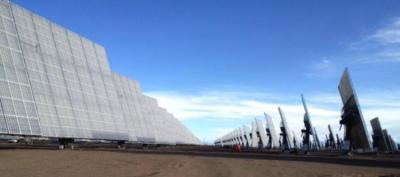Concentrator photovoltaics technology utilizes optics like curved mirrors or lenses to focus a high amount of sunlight onto a tiny area of solar photovoltaic cells to produce electricity.
Concentrator photovoltaics shows promise to deliver affordable electricity in regions like the US desert southwest, which has abundant solar resource to meet the entire energy requirements of the country several times over. Since concentrator photovoltaics systems require a small area, more money can be saved on the expense of the solar cells than non-concentrator photovoltaics. Nevertheless, concentrator photovoltaics still require further improvements to make them ideal for electricity production in regions with large amounts of direct sunlight.
 This is the concentrator photovoltaic system. (photo courtesy of Amonix)
This is the concentrator photovoltaic system. (photo courtesy of Amonix)
On July 25-26, 2012, the University of California, Santa Barbara’s Center for Energy Efficient Materials and the Institute for Energy Efficiency organized a technology roundtable titled ‘Focus on Concentrator Photovoltaics: from cell to system,’ wherein major stakeholders from government, academia, and private sector shared ideas for the research and development of concentrator photovoltaics. Topics covered technological advancements for cells and systems, cell costs, required cell efficiencies, and the bankability of concentrator photovoltaics projects.
The overall objective of the roundtable was to determine the efforts need to be taken to enable concentrator photovoltaics to generate 100 GW of solar electricity in the United States by 2030. This roundtable offered the opportunity to analyze the latest data and to design a new roadmap to facilitate the concentrator photovoltaics industry to achieve its potential, both in the short term as well as in the long term. A post-roundtable report is under preparation, covering the major findings and future steps discussed in the roundtable.
SunPower’s President Emeritus and Founder, Dick Swanson led the technology roundtable. Representatives from the U.S. Department of Energy (DOE) and NREL, including the Director of DOE's SunShot Initiative, participated in the event. Other attendees included representatives from the University of California, Santa Barbara, Universidad Politécnica de Madrid, Ohio State, Stanford, Yale, MIT, University of Arizona, Penn State, Fraunhofer CSE, ISFOC, Ioffe Institute, the Bay Area Photovoltaic Consortium, Soitec, Abengoa Solar, GreenVolts, Solar Junction, SolFocus, Spectrolab, Emcore, Semprius and Sandia National Laboratories, to name a few.